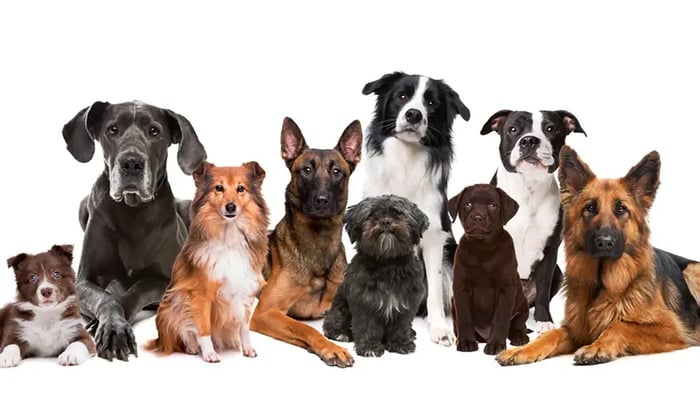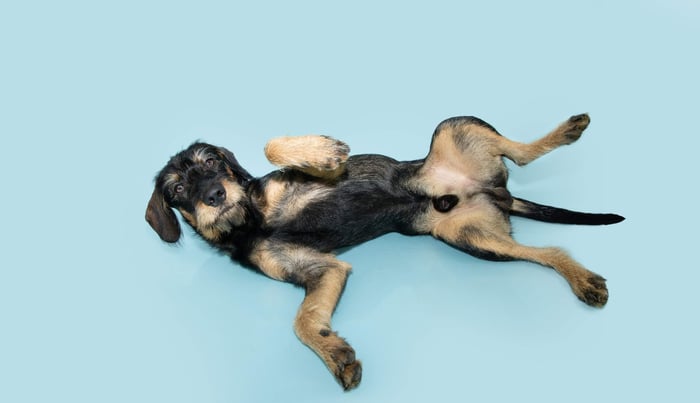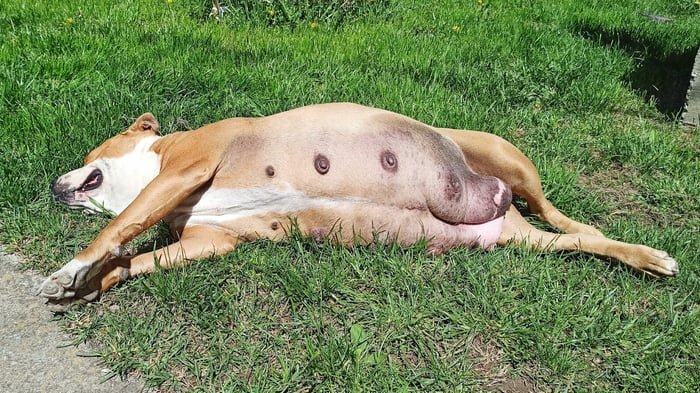Have you ever bought your Lab a flashy new large dog harness only to have them Houdini their way out of it while you’re about to cross a busy intersection? Or have you ever arrived home with a correctly sized small dog harness for your pug, only to find the clips won’t even touch?
Using the dog harness size chart by breed can help you select the right puppy harness for your pup.
While the size and weight charts can differ between companies that design harnesses for dogs, there may also be variations within a breed, so always be sure to correctly measure your dog’s girth and weight and check the company’s chart before ordering.
Why is a Harness Better Than a Collar?
Both dog harnesses and collars have been used for hundreds of years.
Although the collar has been more common over the centuries, sledding dogs of the frozen North and drafting dogs like the Rottweiler and Bernese Mountain Dog have been harnessed to pull sleds and carts since the 18th century.
However, the medical data available to us now shows the full extent of damage a collar can cause your dog.
A collar may hurt a dog’s neck through long-term pulling and jerking or through a sudden accident that creates a whiplash effect on the dog’s neck. This may result in a severe trachea injury, hypothyroidism, ear, eye, and nerve damage.
On the other hand, a harness envelopes your dog’s shoulders and upper body and alleviates pressure on the dog’s throat. Therefore, a harness is far safer for your pup than a collar.
What if My Dog Pulls on a Harness?
According to the PDSA 2019 PAW report, about a quarter of all owners who adopt a dog from a shelter complain that leash pulling as the most common behavioral problem they face. This is certainly a frustrating issue that can drain all the fun out of walking your dog.
The simplest method to deal with a pulling dog is to use an excellent no-pull harness.
In addition, behavioral modification through positive training techniques can work together with your harness to keep your dog walking calmly and politely at your side.
How Do I Know for Sure What Size Harness to Buy for My Dog?
Just like clothes for humans, companies that make and sell dog harnesses can differ in their parameters for a specific size. This means one company’s extra small is another company’s small, and one company’s medium is another company’s large.
Your dog’s breed should help give a general indication of their harness size. For instance, a Chihuahua will probably be an extra-small size while Great Dane will probably be — you guessed it — extra-large.
But dogs can vary wildly within the breed. There are some giant Labs out there and some confusingly small German Shepherds. Not to mention mix breeds, designer dogs, and mutts that can come in any shape or size.
Another point to keep in mind is that dogs also vary according to gender. This means that while your male Samoyed might fit happily in a large harness, your female Samoyed might well need a medium one.
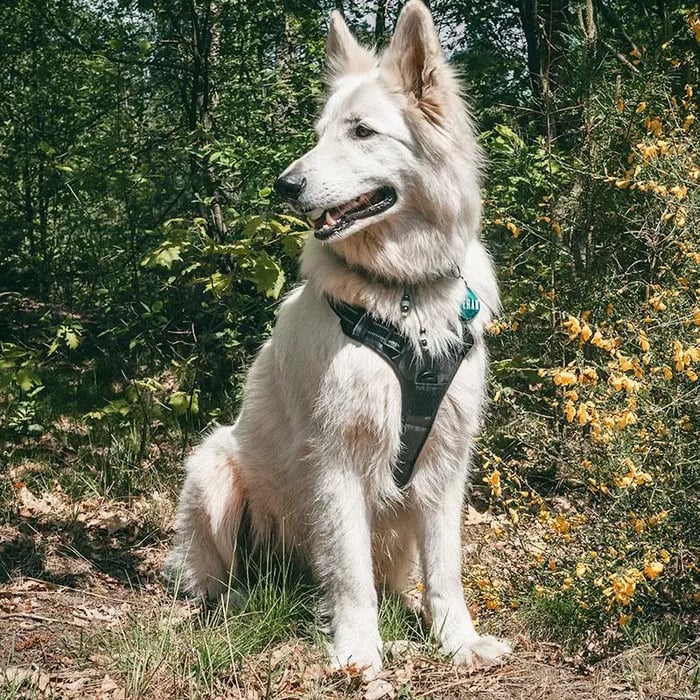
Therefore, selecting a harness based on breed alone can be misleading and result in purchasing the wrong product altogether. It is essential to only use the breed chart only as a general guideline.
One should also be aware that certain breeds are bred to extremes, and finding a harness that fits them can be a challenge.
A Boerboel or a Neapolitan Mastiff can easily tip the scales at 160 pounds, making them too big for many harness brands. If in doubt, contact the company first to ensure they have a harness that will fit your dog.
In sum, it is essential to always check the company size chart and weight chart and take your dog’s measurements before ordering a harness for your pup.
Which Harness Size Should I Buy for My Puppy?
A further consideration is what harness to buy for puppies. For example, what size harness should you buy for a Golden Retriever puppy?
A large breed like the Golden Retriever will undoubtedly grow out of multiple harnesses by the time it is full-grown. Depending on your retriever puppy’s exact proportions, it may start with an extra-small harness at around eight-weeks-old when the average Golden Retriever weighs about 10 pounds.
It may need a small or a medium-size from between four and five months and will likely graduate to large when it has reached eight months.
Keep in mind this is only a general guideline, and puppies can vary in growth curves just as much as human children do. Try to adapt your harness to your puppy’s individual growth.
How do I Measure My Dog’s Girth?
Your dog’s girth is measured from just around his shoulders to the deepest part of his chest. This is usually just behind his elbows. Simply take a tape measure the circumference of its chest from the withers and around the ribcage at the most extended point.
This means starting at the end of the tape at the top of the shoulders and circling the tape around the largest portion of the ribcage to where it meets at the shoulders again.
How Do I Weigh My Dog?
For most dog owners, the easiest way to weigh your dog is to step onto the bathroom scale and weigh yourself. Then get off and climb on again, this time holding your pooch. Deduct your weight from how much you weigh together, and you are left with your dog’s weight.
Of course, if you happen to own a four-pound Teacup Bichon Frise, you can probably make use of your kitchen scales and it would be adorable.
On the other hand, some of us own dogs that are far too big to pick up, at least without slipping a disc. In this case, the best thing to do is to go in to see your vet, who will be able to weigh your dog with their specialized veterinary scales.
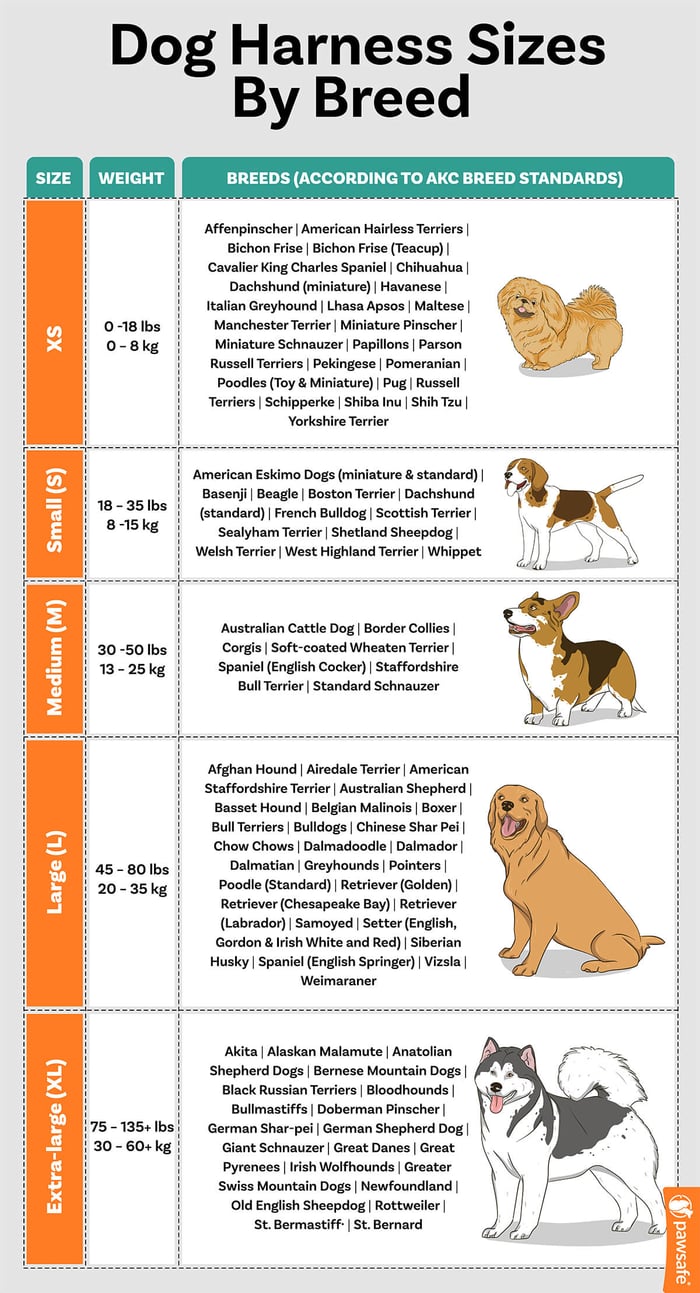
Dog Harness Sizes by Breeds
For an idea of where your dog might fit on the size, weight, and breed scale, you can study the PawSafe dog harness measurement guidelines below for their no-pull harness, which is also designed to work with a doggy seatbelt to keep your pup safe while traveling.
| Size | Weight | Breeds (according to AKC breed standards) |
| Extra-small (XS) | 0 -18 lbs 0 – 8 kg | · Affenpinscher · American Hairless Terriers · Bichon Frise · Bichon Frise (Teacup) · Cavalier King Charles Spaniel · Chihuahua · Dachshund (miniature) · Havanese · Italian Greyhound · Lhasa Apsos · Maltese · Manchester Terrier · Miniature Pinscher · Miniature Schnauzer · Papillons · Parson Russell Terriers · Pekingese · Pomeranian · Poodles (Toy & Miniature) · Pug · Russell Terriers · Schipperke · Shiba Inu · Shih Tzu · Yorkshire Terrier |
| Small (S) | 18 – 35 lbs 8 -15 kg | · American Eskimo Dogs (miniature & standard) · Basenji · Beagle · Boston Terrier · Dachshund (standard) · French Bulldog · Scottish Terrier · Sealyham Terrier · Shetland Sheepdog · Welsh Terrier · West Highland Terrier · Whippet |
| Medium (M) | 30 -50 lbs 13 – 25 kg | · Australian Cattle Dog · Border Collies · Corgis · Soft-coated Wheaten Terrier · Spaniel (English Cocker) · Staffordshire Bull Terrier · Standard Schnauzer |
| Large (L) | 45 – 80 lbs 20 – 35 kg | · Afghan Hound · Airedale Terrier · American Staffordshire Terrier · Australian Shepherd · Basset Hound · Belgian Malinois · Boxer · Bull Terriers · Bulldogs · Chinese Shar Pei · Chow Chows · Dalmadoodle · Dalmador · Dalmatian · Greyhounds · Pointers · Poodle (Standard) · Retriever (Golden) · Retriever (Chesapeake Bay) · Retriever (Labrador) · Samoyed · Setter (English, Gordon & Irish White and Red) · Siberian Husky · Spaniel (English Springer) · Vizsla · Weimaraner |
| Extra-large (XL) | 75 – 135+ lbs 30 – 60+ kg | · Akita · Alaskan Malamute · Anatolian Shepherd Dogs · Bernese Mountain Dogs · Black Russian Terriers · Bloodhounds · Bullmastiffs · Doberman Pinscher · German Shar-pei · German Shepherd Dog · Giant Schnauzer · Great Danes · Great Pyrenees · Irish Wolfhounds · Greater Swiss Mountain Dogs · Newfoundland · Old English Sheepdog · Rottweiler · St. Bermastiff· · St. Bernard |
In short, the harness is a superior product to the dog collar since it puts less strain on your dog’s throat and causes fewer health complications. A no-pull harness is a great option for pups that get a little exuberant on walks.
When choosing the correct harness size for your dog, breed can be a helpful guideline, but it is also vital to measure and weigh your dog, and then check the company’s size and weight chart. If you have any questions regarding which harness to get your pup, please leave a


